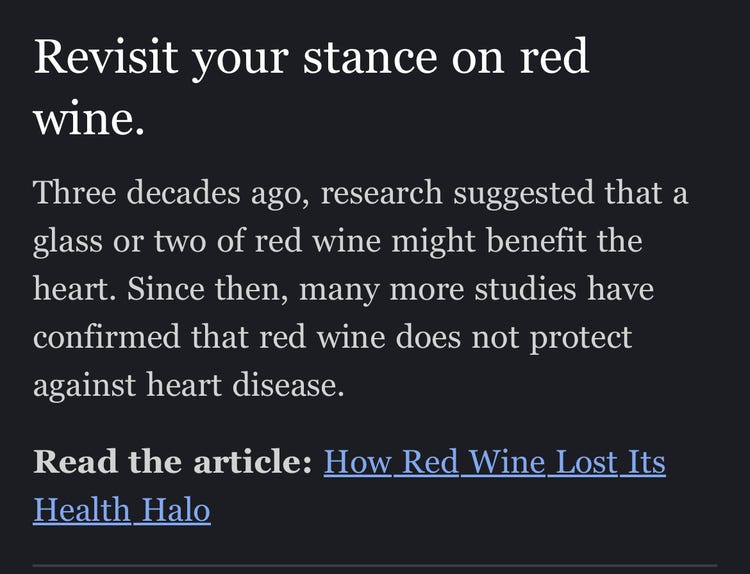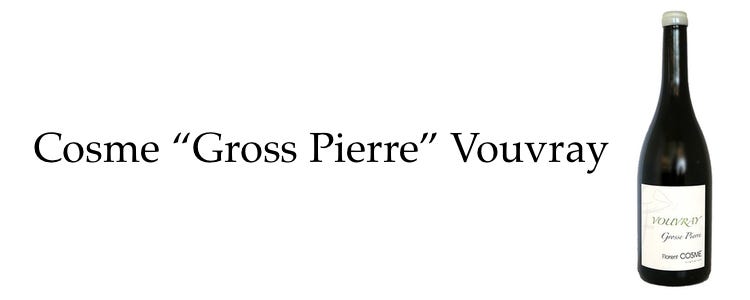Red wine for health? Not so fast.
Red wine is good for the heart, and maybe for our health in general. We’ve known this for three decades or more. Right? Not so fast!
If you’ve been relying on red wine as a sort of medicine, a tasty prescription that, taken daily, will protect you from illness and lengthen your life, recent research has disappointing news.
“For a glorious decade or two, [red wine] was lauded as good for the heart. What happened?” New York Times nutrition and health reporter Alice Callahan inquired in her Feb. 17 article, “How Red Wine Lost Its Health Halo.”
The 30 Second Wine Advisor is a reader-supported community. If you enjoy these biweekly free reports, please consider subscribing! You’ll get twice as many reports on a wider range of wines, and you’ll help us pay the rent!
That “health halo” came to pass back in the early 1990s, when researchers began studying an apparent relationship between moderate red wine consumption and improved cardiovascular health. Their efforts inspired a report by CBS 60 Minutes correspondent Morley Safer in 1996. Safer unveiled what he called “The French Paradox,” the seemingly contradictory reality that the French are statistically unlikely to die of heart disease even though they enjoy a diet rich in butter and cream. The secret to their health and longevity success, Safer concluded, is that they drink a lot of red wine with those fatty meals.
The story generated a wave of publicity, which quickly turned around wine consumption statistics in the U.S. Americans had strongly preferred white wine over red wine for generations, but in the aftermath of Safer’s “French Paradox,” reds took over and have held the lead ever since.
60 Minutes didn’t mention, though, that French people in general also walk more, exercise more, and are much less likely to be obese than the average American. But hardly anyone wanted to hear that, not with such a delightful health benefit right there in the glass that Morley Safer raised in their direction.
Most of us realized, at least instinctively, that this happy outcome, if not too good to be true, at least came with some significant footnotes. As I wrote in a 2008 article “One drink healthy, two not so much,” the French Paradox is complicated by the undeniable health hazards associated with over-consumption. Drinking to excess to protect your heart offers cold comfort if you poison your liver or lose your life in a drunken-driving accident in the process.
All it took was a second glass to counteract the potential benefits of the first one, researchers at the Peter Munk Cardiac Centre of the Toronto General Hospital reported in a 2008 paper in the American Journal of Physiology, Heart and Circulatory Physiology. What’s more, they added in another blow to wine lovers, their study found no difference between the effects of red wine and any other form of beverage alcohol.
In 2006, Scientific American, surveying the research ground, dryly added that even if resveratrol and other red-wine antioxidants did turn out to be a miracle drug, “a wine glass would probably not be the preferred delivery method.”
New York Times report: How Red Wine Lost Its Health Halo.
(NY Times gift article, no paywall.)
Last week’s Times article records mounting doubts of the French Paradox going back to the early 2000s and before. Dr. Tim Stockwell, an epidemiologist at the Canadian Institute for Substance Use Research, and Kaye Middleton Fillmore, a researcher at the University of California, San Francisco, have been pushing back against casual acceptance of the French Paradox since 2001, The Times’ Callahan wrote.
After they sifted through early studies and reanalyzed them in ways that could account for potential biases. Stockwell and Fillmore reported in 2006 that the previously observed benefits of moderate drinking vanished.
As recently as 2023, they published a Journal of the American Medical Association (JAMA) Network Open article, Association Between Daily Alcohol Intake and Risk of All-Cause Mortality – A Systematic Review and Meta-analyses, confirming that alcohol is not the health drink it was once believed to be. A 2022 article by Cleveland Clinic researchers in the same publication found, even more disturbingly, that “There is no level of drinking that does not confer heart disease risk. The risk is small if people have an average of seven drinks a week when compared with none. But it increases quickly as the level of alcohol consumption rises.”
And if that doesn’t worry you, you should know that, obscured in the fog of French Paradox excitement, researchers have known since the 1980s that alcohol is a carcinogen.
So. Should we stop drinking now? Should we hang up this column? Nahhh.
As always, moderation is the key. The Dietary Guidelines from the U.S. Departments of Agriculture and Health and Human Services set recommended daily limits for beverage alcohol as two drinks a day for men and one drink a day for women.
For most people, it’s fine to enjoy a glass of wine every now and then, Dr. Leslie Cho, a cardiologist at the Cleveland Clinic, told The Times. But it doesn’t help your heart, she said. “It’s just time to let go of that belief.”
That coincides with what I’ve been writing on this topic since the very start: Enjoy your wine, do it in moderation, and safeguard your health with a balanced, sensible approach to diet and exercise. But the person who self-prescribes alcohol as a medication, as the old saying goes, has a food for a doctor and for a patient.
What’s more, if we’re freed from reliance on red wine for health, we can take an occasional turn toward a really tasty white wine, like today’s delicious featured Vouvray from the Loire.
Today’s Tasting Report
Florent Cosme 2022 “Gross Pierre” Vouvray Sec ($19.99)
Golden in color, certified organic and biodynamic, Cosme “Gross Pierre” is made from 100% Vouvray. White fruit scents of apples and pears add subtle back notes of rose petals and lime juice in a complex aroma. Flavors carry over on the palate in a textured, almost unctuous yet dry flavor with a high note of acidity holding it all together. Chalky minerality joins the choir in a very long finish. 13.5% alcohol. U.S. importer: Skurnik Wines, NYC. (Feb. 22, 2024)
FOOD MATCH: Versatile with food, it would go well with poultry, pork, sausages, oily fish, or spicy Asian fare. We enjoyed it with a hearty cool-weather meal of Beyond Bratwurst with sauerkraut and onions,
WHEN TO DRINK: Chenin Blanc can be cellared effectively and has potential to evolve well under controlled conditions. Still, this wine is such a delight now, I’d just as soon drink it up over the next year or two.
VALUE:
Wine-Searcher.com lists a $23 average U.S. retail, but I found it for $20 and it’s widely available in that range. It’s a stunning Vouvray, well worth the toll.
WEB LINK:
Here’s a technical sheet on importer Skurnik’s website. For more about Florent Cosme and his wines, visit this Skurnik link.
FIND THIS WINE ONLINE:
Check prices and find vendors for Cosme “Gross Pierre” Vouvray on Wine-Searcher.com.
Read more about Vouvray and browse a variety of examples at this Wine-Searcher link,
Follow this Wine-Searcher link to learn more about the Vouvray grape and browse other wines made with this variety.
Find the wines you want
Explore Wine-Searcher
Wine-Searcher.com is the place to go online if you want to find where to buy a particular wine that interests you. What’s more, Wine-Searcher.com offers so much more. It’s well worth a visit just to discover its many features, including its popular list of the world’s Top 10 Best Value Wines.
Good wines we’ve tried under $10.99!
Want tips to still more good, inexpensive wines? Here are Wine-Searcher links to vendors and prices for a bunch more wines for $10.99 or less that I’ve told you about in recent years. In some cases the prices may have risen over the $10.99 mark since I reviewed them, but they should still be excellent bargains. Please tell us about your favorites!
Sponsor the Wine Advisor.
Support The 30 Second Wine Advisor and help us pay the rent while reaching 25,000 dedicated readers with your sponsorship message in this space, at the top of this E-letter, and on our social media. If you’re an established business in wine, food, and similar ventures, there’s no better way to focus your message toward an audience that comes here for just those topics. See our Sponsorship Page, or email Robin Garr for more information.
Wine Forum and Social Media
You’re always welcome to drop by our WineLovers Discussion Group, the Internet’s first and most civil online community. Discussions are open for public viewing, but you must register to post. To request registration, please contact me at wine@wineloverspage.com, tell me your name, mention the Wine Advisor, and briefly say why you’d like to participate in the forum. Sorry about the minor red tape, but this is our simple, low-tech way to deter spammers and bots.
I’d also be delighted to have you visit and “like” our WineLovers Facebook Page.
Read more articles from The 30 Second Wine Advisor
Previous issue: « Great wine from a war-torn land




